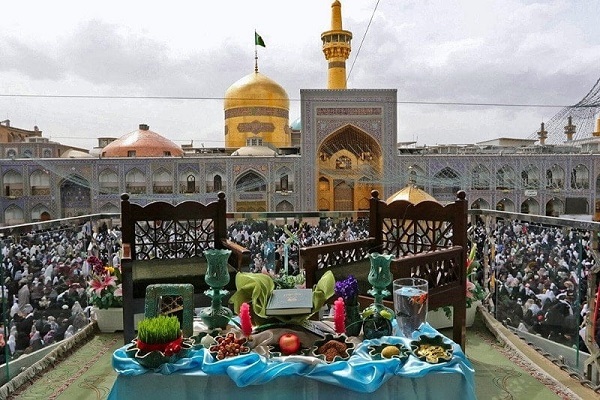Islam and Nowruz: Traditional Iranian Festival of New Year

The word “Nowruz” means new day in Persian. Celebrated for more than 3,000 years on the first day of spring, Nowruz itself a religious occasion practiced by Zoroastrians in ancient Persia.
Later with the emergence of Islam in the seventh century CE and its peaceful dealing with other religious beliefs and rituals, the Iranians festival of New Year remained untouched.
Nowruz was so deeply associated with the Iranian people’s thought and feelings that Iranians seem to have rediscovered their ancient ritual of marking the New Year in their Islamic beliefs and blended their centuries-old traditions with their new religious beliefs.
Accordingly, scholars have explained that Islam does not force nations to abandon their ancient traditions with contents in line with Islamic religious practices.
Nowruz celebrations and traditions are comprised of good deeds such as cleaning of the houses, wearing new clothes, gift giving, visiting relatives, etc. hence they were not rejected by Islam.
Shia sources include different Hadiths (sayings) on Nowruz. According to some of the sayings, Nowruz is a blessed day to be celebrated.
For instance, Imam al-Sadiq (AS), the sixth Shia Imam, is reported to have instructed ghusl (bathing in Islam), wearing one’s best clothes, a special prayer, and fasting on Nowruz.
In another saying, Imam al-Sadiq (AS) is reported to have mentioned a number of important events that had occurred on the day of Nowruz, including the event of Ghadir.
Eid al-Ghadir is a significant Islamic commemorative holiday. The Eid is held on the 18th of Dhul-Hijjah at the time when Prophet Muhammad (PBUH) appointed Imam Ali (AS) as his successor.
While there are sayings about how Islam does not recognize Nowruz as a custom, Allama Mohammad Baqer Majlisi, Iranian scholar and thinker during the Safavid era, concludes that the sayings that recognize Nowruz are more reliable.
Ibn Fahd al-Hilli, an eminent Iraqi Shia jurist and religious authority, also says Nowruz is an “esteemed” (jalil al-qadr) day.
Many other scholars also have sided with first set of sayings which recognize Nowruz celebrations and, on their basis, have recommended bathing and fasting on Nowruz.
Some also associate Nowruz with the day when angel Gabriel appeared to Prophet Mohammad (PBUH) and the day of the re-emergence of Imam Zaman (AJ).
Muslims believe Imam Zaman is the ultimate savior of humankind and the final Imam of the Twelve Imams who will emerge with Isa (Jesus Christ) in order to fulfill their mission of bringing peace and justice to the world.
Moreover, Allama Majlisi in his famous work Bihar al-Anwar (meaning Seas of Light) comprising 110 volumes, has narrated a saying by Imam Sadiq (AS) explaining that “It was on Nowruz that Adam was created, that God made a covenant with the souls, that Abraham destroyed the pagan idols, that the Prophet of Islam received first revelation, that the Prophet took Ali on his shoulders to smash 360 idols in Mecca, and most important of all, that he declared Ali as his legitimate successor.”
Currently Nowruz blends together local cultures and customs with the religious beliefs and interpretations found in different regions of the world. In Iran, it has adopted an Islamic pattern.
The tradition widely spread and became a regular practice even in other countries like Azerbaijan, Afghanistan and countries across Central Asia, as well as their diasporas around the globe.
The United Nations has also marked March 21 as International Nowruz Day — a celebration of spring and the connection between humans and nature.
By Maryam Qarehgozlou



